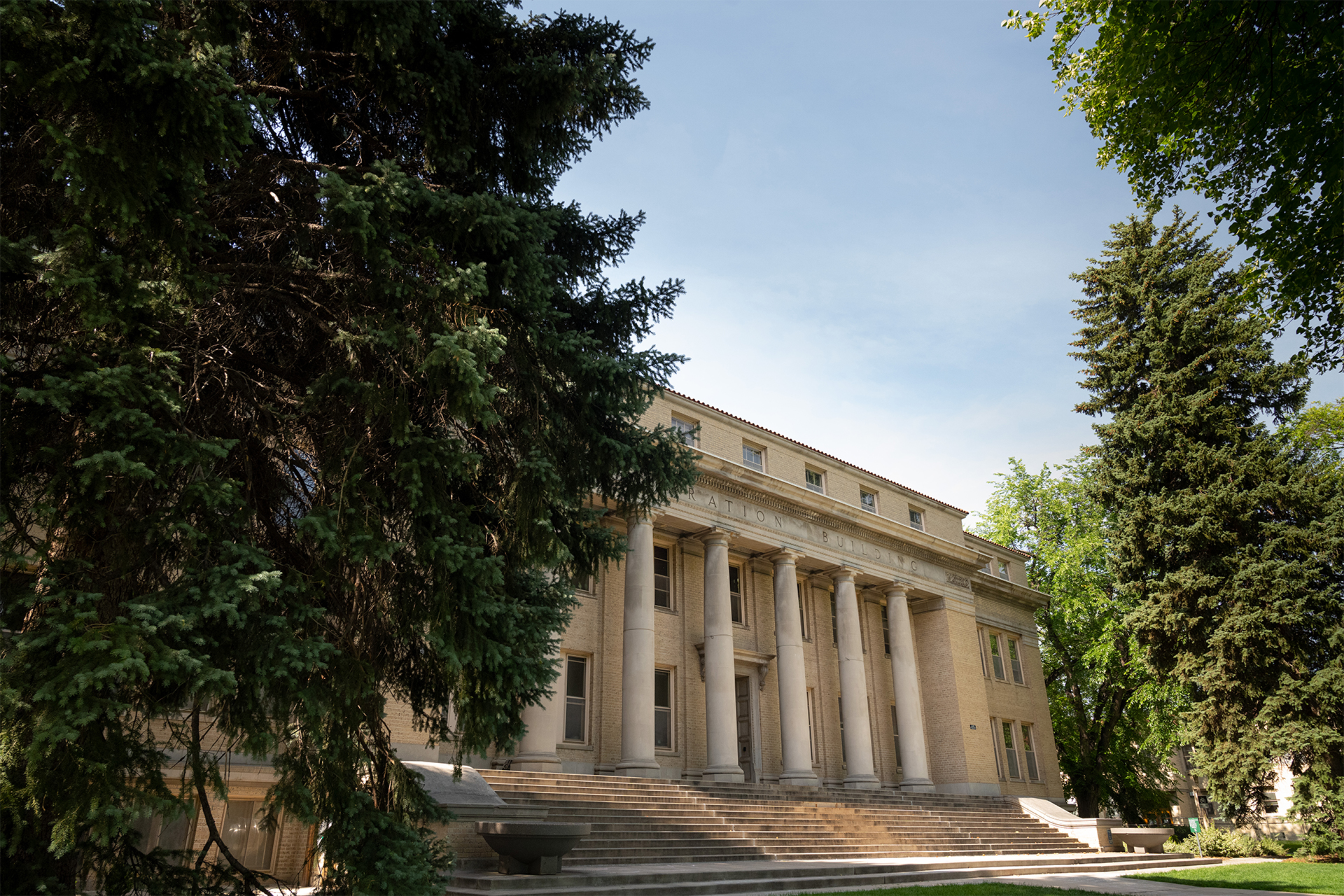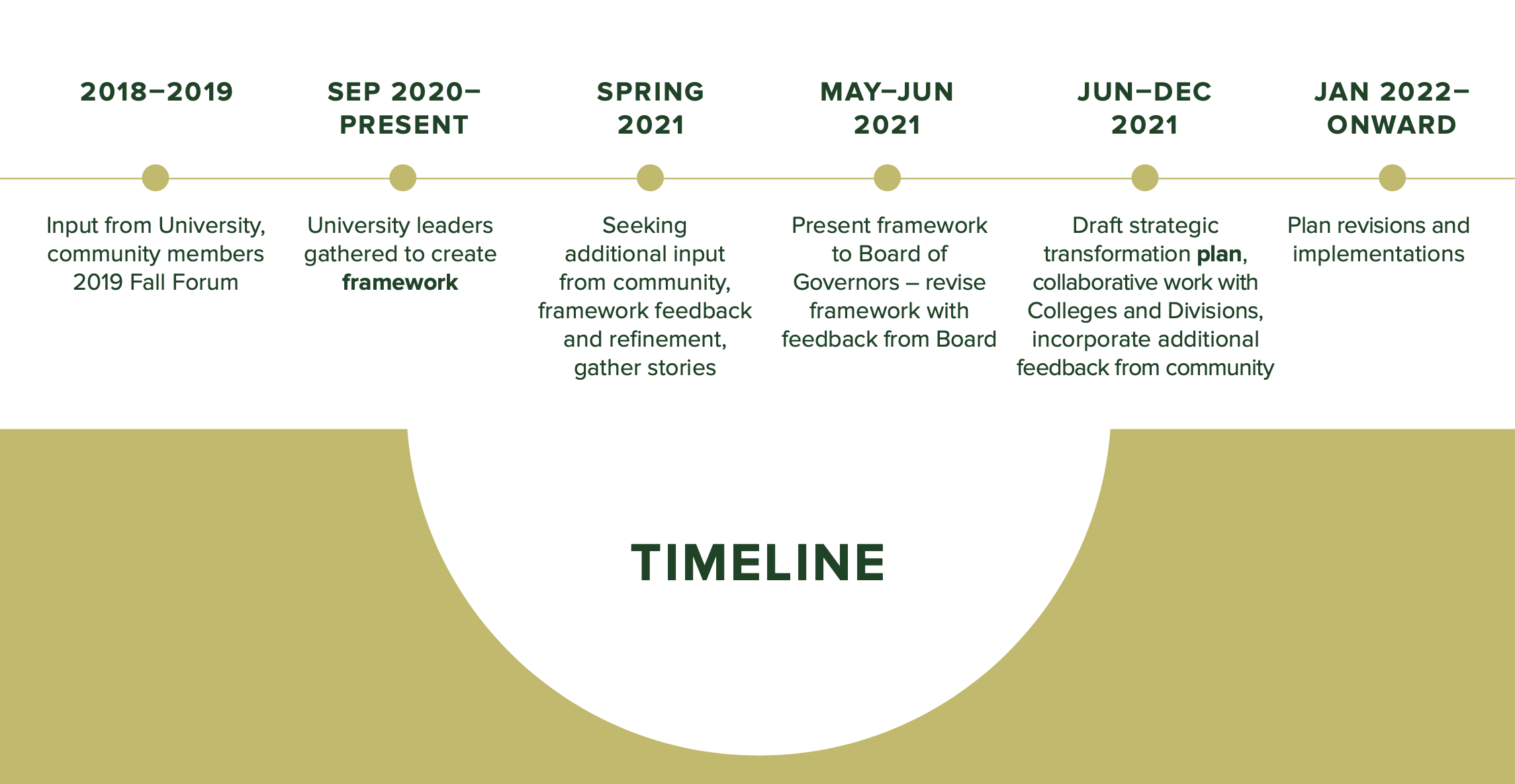
Colorado State University is at a historic moment, and if we lean into it as a community and center the fundamental values that we share, we have the opportunity to fundamentally transform the institution.
That was the message from senior University leadership during a virtual information panel discussion about President Joyce McConnell’s Courageous Strategic Transformation initiative on March 30.
“Our university has been incredibly agile during COVID, and we’ve learned so much about ourselves,” McConnell said. “It’s so important that we build on that momentum of what we’ve learned in responding to a crisis, to being able to plan for the future. We never know what’s in front of us, just like COVID, but we do know that change is going to happen. And we can take charge and be prepared to meet the challenges that come with change.”
McConnell was joined on the panel, which was moderated by Vice President for Strategy Jenelle Beavers, by Provost Mary Pedersen, Vice President for Research Alan Rudolph, Vice President for Student Affairs Blanche Hughes, Vice President for Engagement and Extension Blake Naughton, Interim Vice President for Diversity Roe Bubar, and Dean of the College of Liberal Arts Ben Withers.
The draft framework for the strategic plan was developed in 2020 by the Executive Leadership Team and Council of Deans, and leaders throughout the university have been soliciting input from the CSU community, both on campus and off, since the beginning of this year. The goal is to present the framework to the CSU System Board of Governors at its May meeting.
With input from the Board, the collaborative process of drafting the strategic transformation plan will begin, aligning plans at the college and division level with the University’s vision. Implementation is set to begin in January 2022, but McConnell said even then the plan will continue to be a living document.
“Transformation is something that goes on all of the time,” she explained. “This is not a plan that we will draft and it will sit somewhere and we’ll never go back to it. We’re going to have an active process of planning, of doing, and reflecting on outcomes, and then replanning. So we’ll be in this constant cycle of evaluation.”
Significant feedback
Naughton said that leadership has already gathered a significant amount of feedback on the framework, including from 286 individuals who have responded through an online survey.
Naughton added that part of the process has involved reaching out to committees on campus, not just the shared governance councils – Administrative Professional Council, Classified Personnel Council and Faculty Council – but various advisory groups such as the President’s Multicultural Student Advisory Council. Committees have been providing input to specific portions of the framework relevant to their work and expertise.
According to Naughton, about 800 people have participated in 43 group meetings, including students, staff, faculty, community members and advisory board members external to the University, elected officials and local community members in Fort Collins.
In addition, he said the Center for Public Deliberation has been helping facilitate groupmap sessions where different kinds of groups come together to share their stories. Twenty-five sessions have been held to date, with four more scheduled, which will bring the total number of participants to about 500.
“This is a lot of information to quickly be synthesized and turned around and to say, ‘This is what our university did; they accepted our invitation to hear about, to understand more about what this university needs in this framework, and they brought their voices to the table,’” he said.
Withers said feedback from his college has been very positive.
“In the College of Liberal Arts, and I know in other colleges, we’ve had many opportunities for college town halls, department meetings, meetings with our chairs, etc., and the feedback has been very useful, very robust,” he said. “The faculty and the staff and the students want to know more about the next steps, they want to know how we’re going to create metrics, how we’re going to be able to hold ourselves accountable, and how they’re going to be able to put themselves into this process. This gives us an opportunity to read ourselves into this, then to imagine the way that we can contribute to that as we move forward.”
Hughes said the Division of Student Affairs has already held one student forum and has three more planned, but encouraged students to participate in opportunities presented in their colleges or units where they may work.
“It’s important that we hear your voice, students, and those faculty, staff, others on the call, if you work with students, you’re teaching students, you’re around students, please encourage them to please share their voice with us,” she said. “We can’t do this, and we cannot do it well, without the student voice.”

Why now?
Both Hughes and Bubar talked about the importance of seizing this historic moment to address issues to truly transform the culture of CSU.
“We’re in this period in our history where we have COVID, we have racial injustice, we have social unrest, we have bias, we have political issues. I mean, what else could be hitting us right now, right?” Hughes said. “And yet, we have still come together as a university around our response to COVID, trying to keep our students, our faculty, our staff, safe as well as trying to continue to educate, and that has taken all of us to do that.”
“The other message we’ve gotten is that the world is changing,” she continued. “We have an opportunity to help transform CSU to address systemic racism and systemic injustice. That’s so big sometimes that it can be overwhelming, but here’s something we can do right now, right here, where we have some control. We can transform this institution into the university that we all want to see, all of us co-creating what that can look like for all of us as we move into the future. We need all of us to trust each other a little bit more, and lean into this and give it a shot.”
Bubar agreed.
“I think future generations will ask us what we did in this moment,” she said. “COVID has been the metaphor for all of us. It has told us that we have to change. It has told us that business can’t be usual. And we need each one of us to be asking to switch it up, to be reflective, to engage more in a values-based way forward for our university, for our families, for our communities, and for ourselves. There is potential to have this process move us to operationalized practices and policies that truly address racial equity and social justice.”
Pedersen also emphasized the importance of equity to strategic transformation.
“One of our key institutional values that we have in our framework is diversity, equity, inclusion and justice, and a commitment to being a welcoming community of diverse faculty, staff and students,” she said. “That really speaks to our recruitment and retention policies and practices, which we have already been addressing. We need to continue to look at faculty salaries, pay scales and salary equities across the different ranges for teaching loads and research.”
In response to a question about the budget implications of undertaking such a sweeping process now, McConnell talked about being prepared to make the difficult decisions needed in the face of future budget constraints.
“The Great Recession in 2008 was a huge disruption to the budget,” she pointed out. “A lot of decisions were made then, but that’s 13 years ago now, and we’re facing new challenges. I think that by doing the framework and strategic transformation plan that we prepare for making critical budget decisions by establishing priorities, not just from the top down but in an organic way with a collective voice saying this is who we want to be as a university, and this is what we value.”
The information session was recorded, with ASL interpretation, and will be closed captioned and available on the president’s website. The draft framework for the Courageous Strategic Transformation plan can be found on the president’s website, under Reports and Resources.